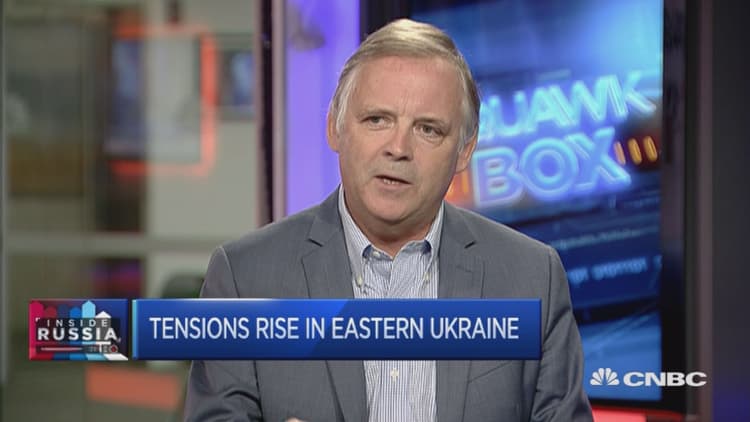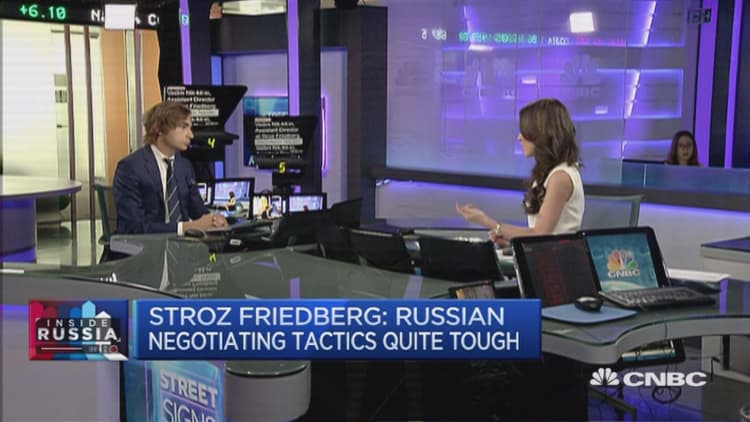
Russia can expect 'indefinite' sanctions for its illegal annexation of Crimea in 2014, according to a Russia specialist who says the country is unlikely to ever hand the territory back to Ukraine.
"It's absolutely our opinion that Crimea-related sanctions will stay indefinitely because clearly Crimea is not going to go back (to Ukraine) as far as the Russians are concerned," Chris Weafer, a senior partner at economic and political analysis firm Macro-Advisory, told CNBC on Tuesday.
But, according to Weafer, the Kremlin only really cares about one damaging restriction – that of its financial sector. "With parliamentary elections coming up in September and although the economy has come someway, it is still on the floor, so showing strength in Crimea and showing that Russia is prepared to defend its interests there is good domestic politics too."
The sanctions Russia cares about

When Russia "illegally invaded" Crimea, a part of southern Ukraine, in early 2014 the international community reacted to what the EU said was a "deliberate destabilization of a neighboring sovereign country' by imposing restrictive measures against it that are still in place.
Sanctions include asset freezes and travel restrictions against individuals, officials and businesses perceived to be involved in Crimea's annexation, as well as a ban on imported goods from Crimea and tourism services.
Russia was also quickly accused of supporting a subsequent pro-Russian uprising in east Ukraine. It denied the charge but the EU and U.S. decided in September 2014 to impose a further batch of economic sanctions targeting - and crucially, isolating - Russia's financial, energy, technology and defense sectors and restricting trade in these areas.
It is these sanctions that have been far more extensive and damaging on the Russian economy than those solely related to Crimea, in no small part causing Russia's economy to nosedive into a recession in 2015 amid the ensuing capital flight.
"You must differentiate the two blocs of sanctions," Weafer noted. "The Crimea sanctions are not going anywhere as far as anybody is concerned but we're looking at (these separate) sectoral sanctions that affect the technology sector, oil and financial sector and of those three, the financial sector ones are the most important," he added.
"When those were applied, there was almost a blanket ban on trade with Russia by credit institutions. You only have to mention financial sector sanctions with U.S. involvement and everyone runs a mile and so they have been disproportionately more damaging and so these are the only sanctions the Kremlin is trying to target at least with the Europeans, come January, and then it hopes the U.S. will follow."
The EU linked its sanctions to the successful and complete implementation of the Minsk agreements and were extended by six months in July amid continued skirmishes involving pro-Russian separatists in the east of Ukraine. These sanctions are due to end in January 2017, however, and there are hopes in Moscow that these most damaging sanctions won't be extended, Weafer said.
"There is now definitely a hope that Europe will start to make some concessions particularly in financial sector sanctions. These are the most damaging, they are holding back the economic recovery and this is a crucial step that needs to happen before we start to talk about Russia pulling back from this recession and going forwards," Weafer said.
Vested interests
Despite hopes in Moscow that the EU could be becoming more willing to soften its sanctions, a removal of economic sanctions is predicated on the successful implementation of the Minsk agreement – a ceasefire between Ukraine and Russia which was brokered by Germany and France.
The agreement is looking as fragile as ever amid an increase in tensions in both Crimea and the Donbas region of east Ukraine, however, with both sides accusing each other of failing to implement their parts of the deal and of provoking a new conflict.
Concerned international observers have called for restraint and on Monday, Germany's foreign minister met with his Russian counterpart to "call on everyone to de-escalate." Russia's Foreign Minister Sergei Lavrov said that Moscow would take "comprehensive measures to make sure any attempts to make incursions into our territory are nipped in the bud," Deutsche Welle reported.
But Weafer said that both countries could have reasons for stirring up tensions.
"Moscow has become quite frustrated with the Minsk process, they see that it has stalled, they blame Germany and France for not putting enough pressure on (Ukrainian President Petro) Poroshenko to deliver on his side of the deal which is to deliver on regional elections in the east," he told CNBC.
"We could by cynical about Crimea and say that while it is clearly not in Moscow's interests to escalate this into a fight – and nor is it in the interest of Ukraine to escalate this into a fight – it is in the interest of both to put this very much back on the agenda," he added.
"Poroshenko is waiting for IMF (International Monetary Fund) money (a bailout package) that hasn't come, he's worried that the EU is softening its position on Russia. So they're worried that they might be sidelined at the expense of Moscow and Moscow is worried that progress is too slow, so it's in the interest of both to raise the profile of this and to raise the tension but to not cross the line."


